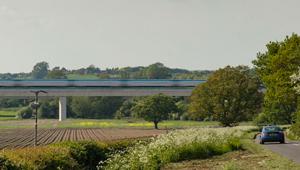By Richard Johnstone | 13 December 2013
The proposed High Speed 2 rail line linking London with the Midlands and north of England is needed to provide a long-term increase in the capacity on the railway network across the country, the transport select committee has concluded.
Analysing the planned line, MPs said that capacity constraints on the existing West Coast mainline ‘cannot be ignored’, and alternatives to HS2 would be costly and disruptive, and could only provide short-lived benefits given forecast increases in passenger numbers.
However, they also called for ministers to be clear about the proposed costs of the new route, which is intended to open between London and Birmingham in 2026 and on to Manchester and Leeds by 2032.
The total budget for the scheme was increased as part of June’s Spending Review to £42.6bn, almost £10bn more than previously thought.
However, the committee said the Department for Transport must make clear that estimated cost of construction is just £28bn with the remaining £14.6bn to be used as contingency and to finance new trains.
MPs also called for ministers to look at the case to speed up construction by building the line south towards London at the same time as the planned northwards development.
Chair Louise Ellman said the committee supported the updated case for the line published by the government in October.
‘Having looked at this, and at new research by KPMG that examined the project’s possible regional economic benefits, we remain confident that construction of a new high speed line is the only way to deliver the step change in capacity on the West Coast mainline needed to accommodate long-term demand for both passengers and rail freight.
‘HS2 can also play a major role in promoting economic growth in the UK’s major city regions. We welcome the assurance given to us recently by Sir David Higgins, incoming chair of HS2, that he will re-examine the case for building the line from north-to-south, as well as from London northwards.’
The committee also called on councils and local enterprise partnerships to devise economic strategies that can make the most out of HS2, and for ministers to ensure UK firms and workers benefit from construction deals.
Responding to the report, Transport Secretary Patrick McLoughlin said HS2 would be ‘a heart bypass for the clogged arteries of our transport system’.
He added: ‘We therefore welcome the transport select committee’s conclusion that the new north-south railway is the best long-term solution to increasing capacity and that alternative proposals would simply not cope with the predicted increase in demand.
‘The committee also concludes that HS2 will not come at the cost of other transport projects and that the benefits to northern cities could transform the nation’s economic geography. This chimes closely with steps we have already taken.’
However, campaign group Stop HS2 said the report was a ‘cheerleading whitewash’ for the project.
Campaign manager Joe Rukin said: ‘It is totally contradictory for the committee to say HS2 won’t starve other projects of investment at the same time as saying government should spend more money on it more quickly by building the northern and southern ends at the same time.
‘Those two statements can’t be reconciled and just demonstrate that this report serves no other purpose than to be a cynical attempt to bring round a sceptical public.’




















